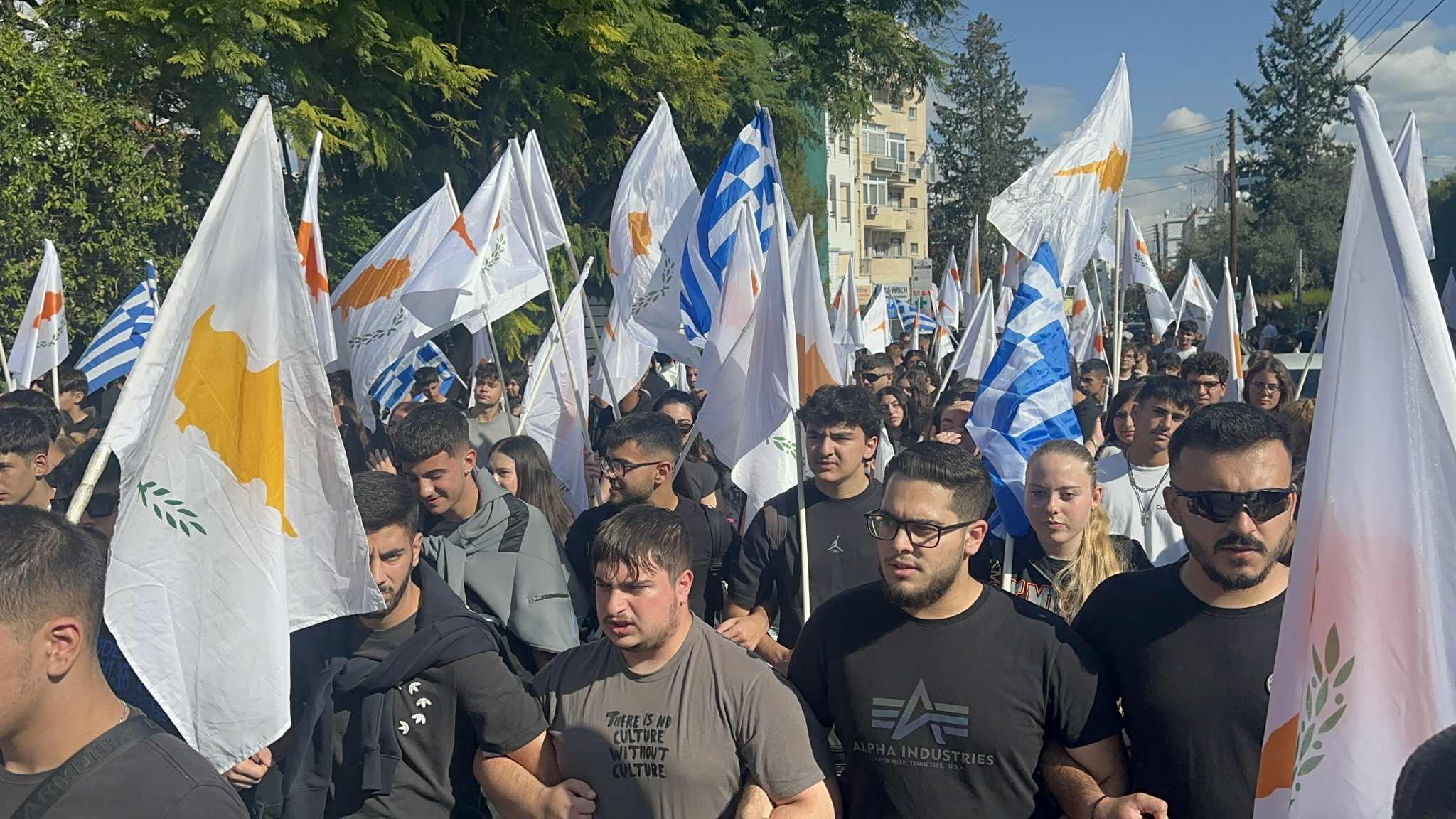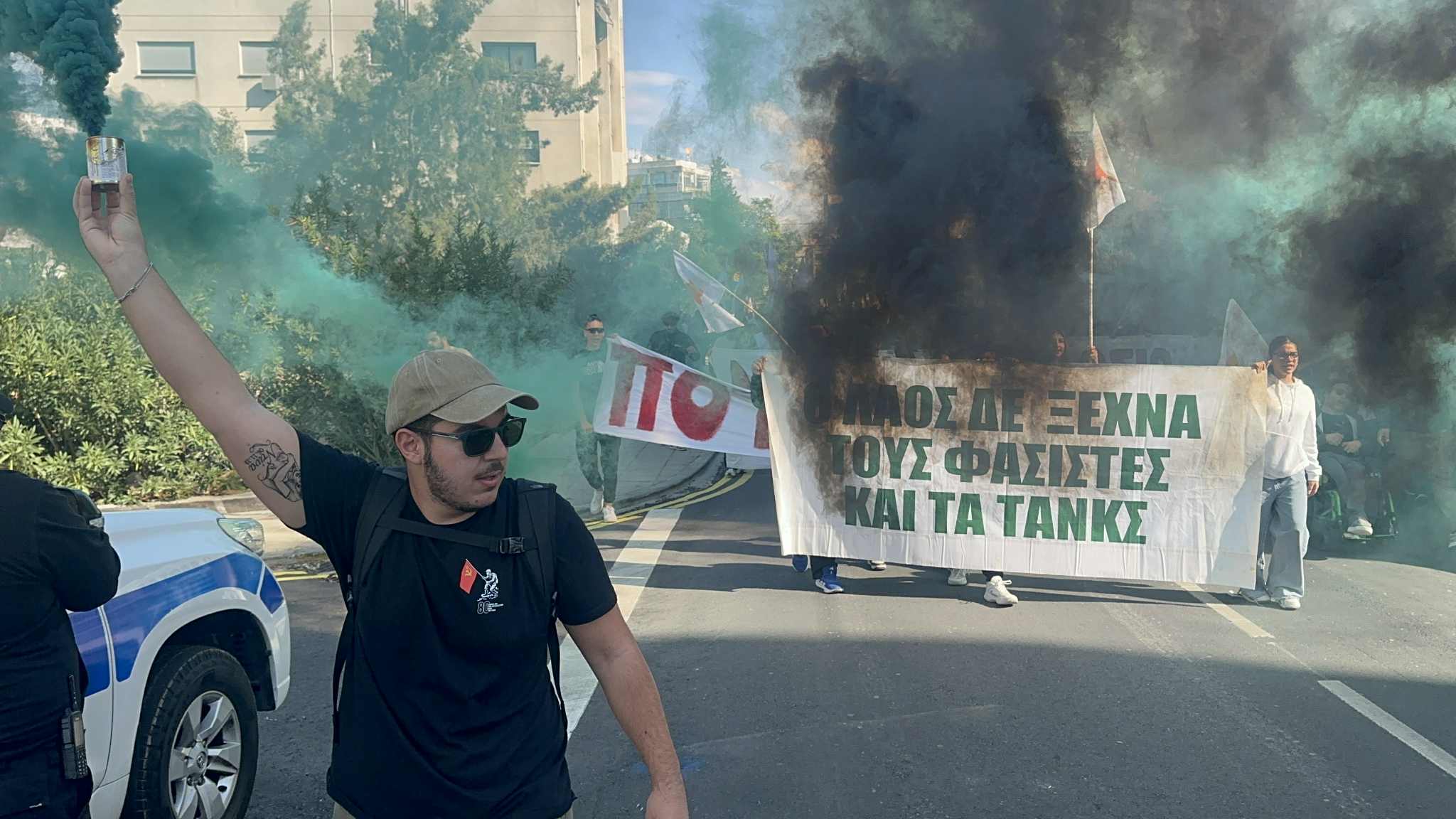Students call on US to stop playing role of ‘unelected global policeman’
Events were held on Monday in Cyprus to honour the November 17, 1973, uprising against the junta in Greece, during which the military dictatorship sent a tank into the polytechnic leading to the death of scores of people.
Holding a huge banner reading “The people don’t forget the fascism and the tanks”, people marched in Nicosia on Monday morning from the city centre to the US embassy, where an event was staged outside the building, where they handed a resolution calling on the US to stop playing the role of the “unelected global policeman”.
Participants in the event organised by student umbrella organisation Psem sent messages of freedom for Cyprus and Palestine, as well as free public education.
Students were waving the flags of Greece and Cyprus, chanting slogans for peace and against fascism and imperialism.
In his speech outside the US embassy, Psem president Achilleas Georgiou said the youth had a duty to continue the struggle against imperialism and fascism, thus keeping the ideals of the Polytechnic alive.
Georgiou said that over recent years the events to mark the anniversary of the uprising have gained even greater importance, given the situation in the Middle East, where “the state of Israel, with the agreement of the US and Nato, has proceeded undisturbed with an unprecedented genocide, murdering children and civilians.”

“At the same time, in other parts of the world, the US, Nato and their allies continue to shed the blood of peoples and draw borders to the benefit of the few. They continue to this day their imperialistic interventions, coups and destabilisation of whole regions, in order to impose their universal supremacy,” Georgiou added.
He said “our resistance shows that we cannot accept their ‘new world order’, we cannot accept the continuous dismemberment of the world for the interests of the powerful.”
The students, he added, were fighting for a world of peace, without wars, where people will live in dignity.
“We want a free and reunified homeland, where Greek Cypriots and Turkish Cypriots will live as brothers. A homeland without foreign armies and guarantees, far from Nato and its branches,” Georgiou said.
The event was addressed by representatives of various student organisations, who said the 1973 uprising sent a message that was more than ever alive today and acted as a “beacon and compass” for struggles against imperialism, oppression and injustice.
A three-member Psem delegation then handed a resolution to representatives of the US embassy.
The resolution calls on the US to “end the policy of leading and manipulating the will of the peoples of the world by playing the role of the unelected global policeman”.
It also expressed the will for a solution of the Cyprus problem that would be in line with the acquis Communautaire and restore the human rights of all Cypriots.
In Greece, 5,000 police officers were posted in central Athens hours before the 3pm march to mark the anniversary.
People of all ages have been gathering since early on Monday morning outside the Polytechnic to honour those lost in the uprising.
Metro stations in central Athens were set to close at 5pm.
Political parties in Cyprus issued statements on Monday to mark the anniversary.
In its statement, Disy said the anniversary stands as a reminder that the principles, values and ideals of Hellenism could not be exploited by regimes and anti-democratic minorities.
Akel said the 1973 uprising continues to inspire young people and every democrat and progressive person, and the then slogan “US out, Nato out” remains the heart of the struggle.
Diko pointed out that democracy should not be taken for granted and condemned “every form of fascism and attempts to falsify the historic truth”.
Edek said “the slogan remains engraved since then: Never again fascism”.
Dipa said the uprising was not just a historical moment, but a timeless symbol of resistance against authoritarianism.
The Cyprus Greens said the Polytechnic remains a beacon of inspiration and “lives in today’s struggles and pursuits”.






Click here to change your cookie preferences